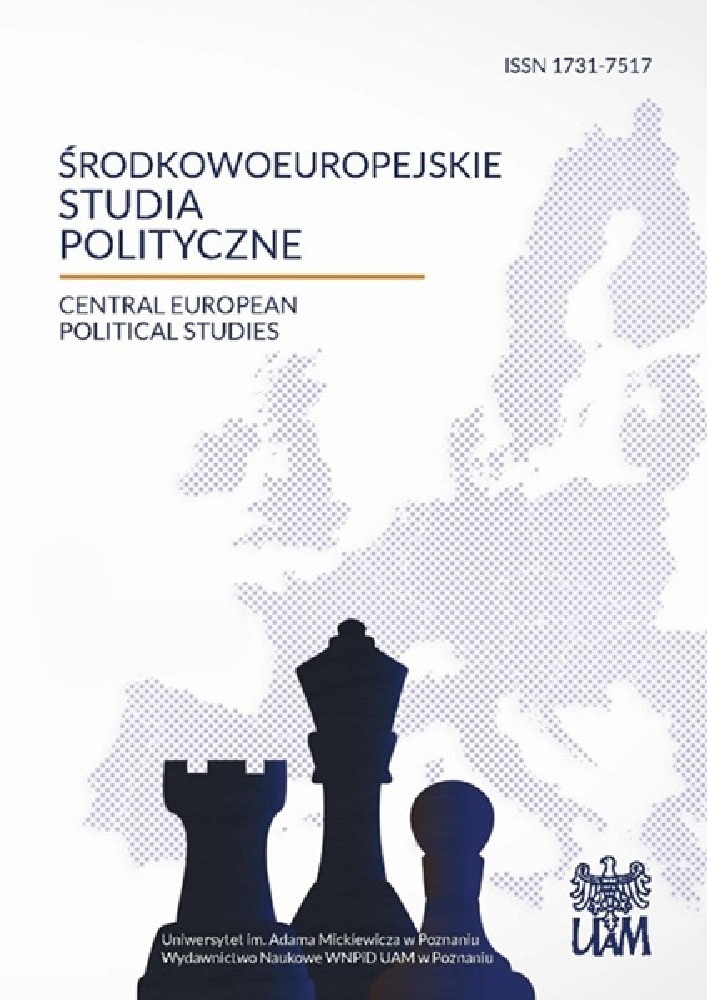Abstract
This text reflects on the role of the global market, defined as the space where various relations between states and private entities take place. The following examples are provided in the case of the latter: private arbitration, rating agencies, International Standard Organisation, The Internet Corporation for Assigned Names and Numbers, and Codex Alimentarius Commission. The market is depicted in the context of a number of economic and financial phenomena constituting the contemporary face of globalization. The article also presents the diverging standpoints of researchers as concerns the role attributed to the market in global governance as the space of activities of non-state entities, especially considering the fact that – as a more and more vital holder of power exceeding that of state powers – private structures are acquiring broad autonomy within national and international law. Thereby, they become important regulators of jurisdiction and the international economy. From this perspective, globalization leads to the extension of the scope of rules regulating more and more fields of economic activity conducted beyond national borders. The further weakening of the role states have in relation to market powers and entities involved in a broad range of actions in economy, trade, and international finances is therefore plausible.References
Ammer J. M., Packer F. (2000), How Consistent Are Credit Ratings? A Geographic and Sectorial Analysis of Default Risk, FRB International Finance Discussion Paper, No. 668.
Boot A. W. A., Tood T. M., Schmeits A. (2006), Credit Ratings as Coordination Mechanisms, „Review of Financial Studies”, Vol. 19(1).
B20 (2013a), B20–G20 Partnership for Growth and Jobs: Recommendations from Business 20, http://www.b20russia.com/B20_WhiteBook_web.pdf, 27.09.2013.
B20 (2013b), From Toronto to Saint Petersburg: Assessing G20-B20 Engagement Effectiveness: Draft Report, www.hse.ru/data/2013/06/24/1287462471/G20-B20_engagement_effectiveness_report_full.pdf, 27.09.2013.
Biersteker T. J., Hall R. B. (red.) (2002), The Emergence of Private Authority in Global Governance, Cambridge University Press, Cambridge.
Brown G.W., Globalization is WhatWe Make of It: Contemporary Globalization Theory and the Future Construction of Global Interconnection, „Political Studies Review” 2008, Vol. 6, nr 1.
Brylak J. (2011), Agencje ratingowe na rynku inwestycji. Prawne aspekty instytucji, Polskie Towarzystwo Naukowe, „Zeszyty Naukowe”, nr 11.
Commission on Global Governance (1995), Our Global Neighbourhood, Oxford University Press, New York.
Cutler C., Haufler V., Porter T. (red.) (1999), Private Authority and International Affairs, SUNY Press, New York.
Gates B. (2011), Innovation with Impact: Financing 21st Century Development, Cannes, http://www.thegatesnotes.com/~/media/Images/GatesNotes/G20/G20-Documents/g20-report-english.pdf, 28.09.2012.
Hajnal P. (2007), The G-8 system and the G-20: evolution, role and documentation, Ashgate, Aldershot.
Harvey D. (2005), A Brief History of Neoliberalism, Oxford University Press, Oxford.
Kołodko G. (2013), Dokąd zmierza świat. Ekonomia polityczna przyszłości, Warszawa.
Kołodko G. (2010a), Neoliberalizm i światowy kryzys gospodarczy, „Ekonomista”, nr 1.
Kołodko G. (2010b), Neoliberalizm i systemowy kryzys globalnej gospodarki, w: Globalizacja, kryzys i co dalej?, red. G. Kołodko, Warszawa 2010.
Kołodko G. (2008), Wędrujący świat, Warszawa.
Łoś-Nowak T. (2011), Polityka zagraniczna w przestrzeni teoretycznej, w: Polityka zagraniczna.
Aktorzy – potencjały – strategie, red. T. Łoś-Nowak, Poltext, Warszawa.
Mandel E., Late Capitalism, Verso Books, London 1975.
Mattli W. (2001), Private Justice in a Global Economy: From Litigation to Arbitration, „International Organization”, Vol. 55.
MattliW., Büethe T. (1993), Setting International Standards: Technological Rationality or the Primacy of Power, „World Politics”, Vol. 56.
Murphy C. N. (1994), International Organization and Industrial Change. Global Governance since 1850, Polity Press, Cambridge.
Naím M. (2009), Think Again: Globalization, „Foreign Policy”.
Official Journal of the European Communities L 336, 23/12/1994.
Overbeek H. (2005), Global governance, class, hegemony. A historical materialist perspective, w: Contending Perspectives on Global Governance. Coherence, contestation and world order, red. A. D. Ba, M. J. Hoffman, Routledge, London– New York.
Pietrzak E. (2013), Nieposłuszeństwo i profanacje – globalne społeczeństwo obywatelskie, „Przegląd Politologiczny”, nr 1.
Prévost D., Van den Bossche P. (2005), The Agreement on the Application of Sanitary and Phytosanitary Measures, w: The World Trade Organization: Legal, Economic and Political Analysis: Volume I, red. P. F. J. Macrory, A. E. Appleton, M. G. Plummer, Springer, New York 2005.
Reinecke W. (1998), Global Public Policy: Governing without Government?, Brookings, Washington, DC.
Rewizorski M. (2011), The WTO Legal System, Volume 2. The Uruguay Round Agreements (Agreement Establishing the World Trade Organization – Annex 1A), Offset, Kołobrzeg.
Scott J. (2007), The WTO Agreement on Sanitary and Phytosanitary Measures: A Commentary, Oxford University Press, Oxford.
Slaughter A. M. (1997), A New World Order, „Foreign Affairs”, Vol. 76, nr 5.
Slaugther A. M. (2004), A New World Order, Princeton University Press, Princeton.
Slaughter A. M. (2000), Governing the Global Economy through Government Networks, w: The Role of Law in International Politics, red. M. Byers, Oxford University Press, Oxford.
Slaughter A. M. (2005), Government Networks,World Order, and the L20, w: Reforming from the Top: A Leaders’ 20 Summit, red. J. English, R. Thakur, A. F. Cooper, United Nations University Press, Tokyo 2005.
Slaughter A. M. (2009), America’s Edge: Power in the Networked Century, „Foreign Affairs”, Vol. 88, nr 1.
Słojewska A. (2011), Agencje: wróg publiczny nr 1, „Rzeczpospolita”, 15.07.2011. Standard & Poor’s: http://www.standardandpoors.com/ratings/sovereigns/ratingslist/en/eu/?subSectorCode=39&start=50&range=50, 3.11.2013.
Strange S. (1997), Territory, State, Authority, Economy: A New Realist Ontology of Global Political Economy, w: The New Realisms: Perspectives on Multilateralism and New World Order, red. Robert W. Cox, United Nations Press, Tokyo.
Streeck W., Schmitter P. C. (1985), Community, Market, State–and Associations?, „European Sociological Review”, Vol. 1.
The Stanley Foundation (2009), Courier. Waiting to Join the Club, No. 63.
WTO (2007), Understanding the WTO, Geneva.
Żyżyński J. (2009), Neoliberalizm jako strukturalna przyczyna kryzysu a poszukiwanie dróg naprawy, „Ekonomista”, nr 2.
Zürn M. (1995), The Change of Globalization and Individualization: a View from Europe, w: WhoseWorld Order? Uneven Globalization and the End of ColdWar, red. H. H. Holm, G. Sørensen, Boulder, Westview.
License
Copyright
© 2014, Uniwersytet im. Adama Mickiewicza w Poznaniu, Wydawnictwo Naukowe Instytutu Nauk Politycznych i Dziennikarstwa
OPEN ACCESS
